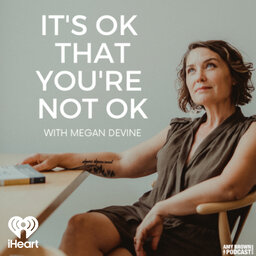adrienne maree brown: Can We Give Ourselves Permission to Be Free?
What if there’s nothing to fix? What if you could just, you know, be yourself - whatever that looks like today?
When I told people that this week’s guest was none other than adrienne maree brown - the excitement level was off the charts. adrienne maree brown is the author of Emergent Strategy and Pleasure Activism, among other works, and she’s instrumental in opening conversations about bodies, power, grief, and change (personal and collective).
This week, it’s all grief - and it’s all love. There is nothing to fix, and there is plenty to change.
In this episode we cover:
- How self-sabotaging behaviors become addictive
- The freedom of being yourself (and why that pisses other people off)
- How can you make this day worthy of your grief?
- Why humor sometimes fits “the shape of grief” and sometimes it does not
- Feelings are your body’s way of communicating needs
We're re-releasing some of our favorite episodes from the first 3 seasons.
Looking for a creative exploration of grief? Check out the best selling Writing Your Grief course here.
Related episodes:
Book bans, grief, and love: what do these have to do with social movements? Malkia Devich-Cyril
Is There Any Good News on Climate Change? With Bill McKibben
Coming Home to Yourself with Alex Elle
About our guest:
adrienne maree brown is the author of wildly influential books including Emergent Strategy, We Will Not Cancel Us and Pleasure Activism, plus the novellas Grievers and Maroons. She is a social media meme queen, writer, podcaster, musician, and movement facilitator based in Durham, NC.
Find her at adriennemareebrown.net and on Instagram and Facebook.
About Megan:
Psychotherapist Megan Devine is one of today’s leading experts on grief, from life-altering losses to the everyday grief that we don’t call grief. Get the best-selling book on grief in over a decade, It’s Ok that You’re Not OK, wherever you get books. Find Megan @refugeingrief
Additional resources:
Boundaried in Love with Prentis Hemphill and adrienne maree brown
“The Pleasure Dome” by adrienne maree brown, Bitch Media
Want to talk with Megan directly? Join our patreon community for live monthly Q&A grief clinics: your questions, answered. Want to speak to her privately? Apply for a 1:1 grief consultation here.
Check out Megan’s best-selling books - It’s OK That You're Not OK and How to Carry What Can’t Be Fixed
Books and resources may contain affiliate links.
In 1 playlist(s)
It’s OK That You’re Not OK with Megan Devine
Life is full of difficult things, from tiny everyday disappointments to life-altering events. Everyo…Social links
Follow podcast
Recent clips

Protecting Your Mental Health in the Healthcare Workplace, with the Burned Out Burnout Expert, Dr. Jessi Gold
37:29

Over and Over Again: Illustrator Aubrey Hirsch on the Power of Storytelling
39:19

Untangled: Suffering & The 8-Fold Path with Koshin Paley Ellison
1:02:51
 It’s OK That You’re Not OK with Megan Devine
It’s OK That You’re Not OK with Megan Devine